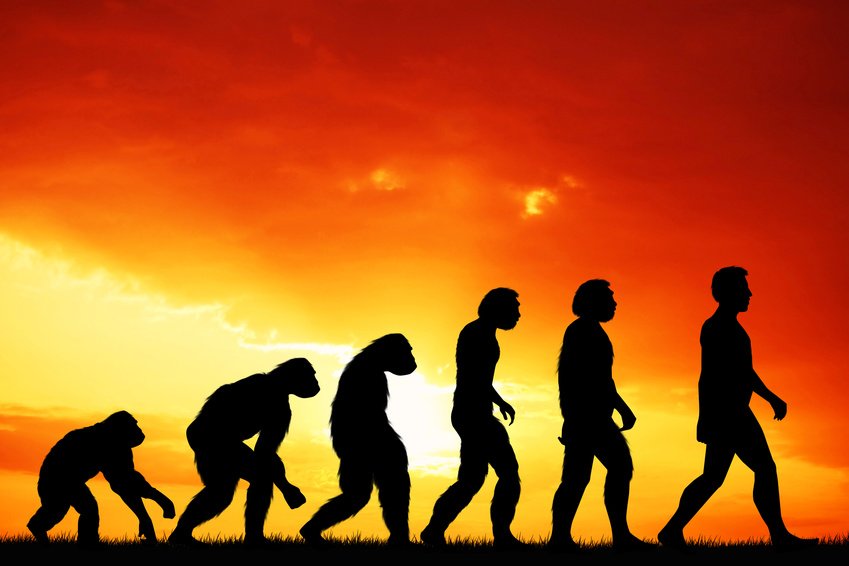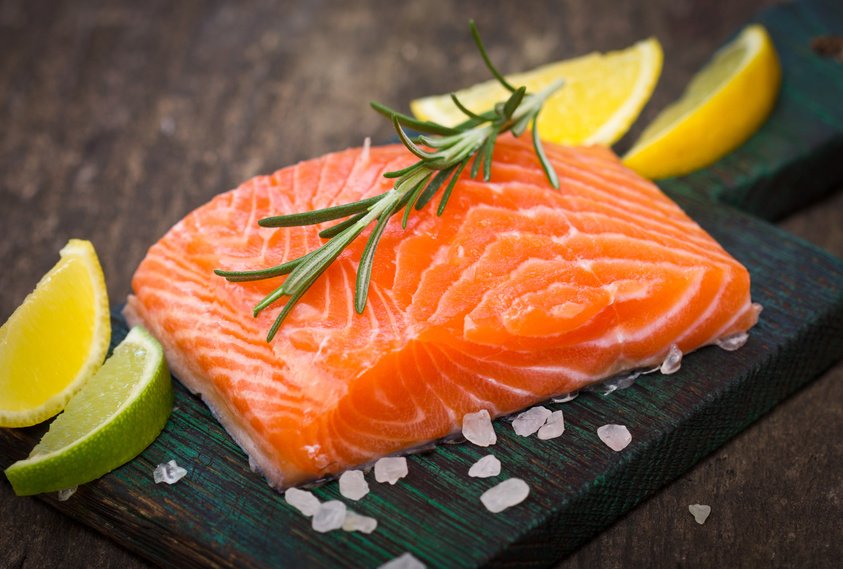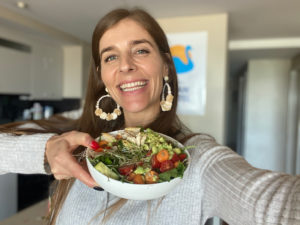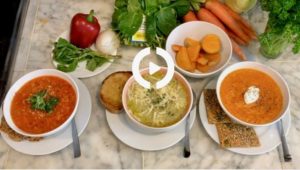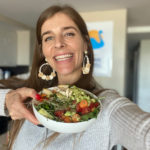In the past few years, vegetarian and vegan lifestyles have become synonymous with being ‘healthy’. Meat-eaters at BBQs today guiltily huddle together in a corner chewing on their ribs and sausages, while vegetarians virtuously grill their portabello mushrooms and summer squash, glowing with health and smugness.
But is eating meat really bad for you? In this article, we consider the case for eating meat from a health perspective and also highlight some of the key points to consider in choosing meat and balancing your diet for optimum health.
The case for eating meat, dairy, eggs & fish
Recent food documentaries like Food Inc, Forks over Knives and Vegucated promote the benefits of a vegetarian or vegan diet, and decry the hidden dangers of eating meat. Meat, we have been told, is associated with obesity, high cholesterol, heart disease, diabetes, high blood pressure, and a host of cancers. One only has to spend about 5 minutes on social media or reading health magazines to be bombarded with offers of vegan meal delivery, raw recipes, and articles promoting the virtues of vegetarianism. For people who care about their health, it is easy to internalize these messages and start seeing meat as an unnecessary and harmful vice.
Before you throw out your steak knives, consider these top 4 arguments in the case for eating meat for optimum health and longevity.
1. Humans evolved eating meat, fish, and dairy
Humans (and our ancestors) have been eating meat for at least one or two million years. If you divide our diet into two eras, the Paleolithic (Stone Age, a couple of million years ago) and the Neolithic (Farming Era, around the 10,000-year mark), then anything you can hunt, fish or gather (meat, fish, poultry, eggs, nuts, berries, insects) is a traditional part of our diet. Dairy foods probably fall somewhere before farming (a couple of hundred thousand years ago), as many experts believe humans began herding stock before we commenced agriculture.
The upshot of this is that humans evolved as the most successful species on the planet, with the most complex brains, on an omnivore diet. The fertility and pregnancy foods in all traditional societies were (and are) of animal origin – including milk for the Maasai in Kenya, grass-fed butter for the Swiss, and fish eggs sought by Peruvian tribes. According to ‘Real Food’ (2009) author Nina Planck, anthropologists have yet to identify a human society that has survived living on plant foods alone, even vegan groups have been found to seek out and feed animal products to their women before marriage or during pregnancy.
2. Meat may protect against diseases
But doesn’t eating meat make you Fat, Sick & Nearly Dead? Well, not necessarily. Although eating meat has been blamed for a score of chronic diseases and health conditions – including obesity, high cholesterol, heart disease, diabetes, high blood pressure, a host of cancers, and even impotence! – many of these studies are now being questioned or overturned by new evidence.
Leading researchers and food experts, such as the Harvard School of Public Health, have now discredited theories linking saturated fats found in meat to heart disease stating that “they are based on little scientific evidence and may have caused unintended health consequences” (Frank Hu, Journal of American College of Nutrition). One study of 118,000 people found no evidence of a significant association between egg consumption and heart disease. In fact, people who ate up to a half dozen eggs per week actually had a lower risk of heart disease, as natural cholesterol, raises HDL (good cholesterol), which protects your heart.
As Nina Planck, author of ‘Real Food’ points out:
“One problem is timing, We’ve been eating pork and butter for millennia, but heart disease is a modern problem. The first heart attack was diagnosed in 1912. Epidemiological evidence also contradicts the assertion that traditional foods cause chronic metabolic conditions. People who (still) eat traditional diets – rich in saturated coconut oil, whole milk, and red meat – don’t get fat. They don’t get diabetes and heart disease either.” The real culprit, according to Nina Planck and many whole food advocates, is industrial foods, like white flour, corn oil, and refined sugars. According to the New York Times, fat is back, and people have been needlessly avoiding eggs, liver, and shellfish for decades.
3. Meat, eggs, dairy & fish are nutritional powerhouses
Meat, eggs, dairy, and fish are nutritional powerhouses. They are the best (or only) sources of numerous macro and micronutrients essential for optimum health. For example:
• Vitamin B12: This little known vitamin is essential for healthy red blood cell production, supporting the cardiovascular system, and protecting anemia. It is also necessary for DNA production, the brain, and nervous system health. Plants cannot create and do not contain vitamin B12 (except mushrooms and fermented foods which are a fungus and contain microorganisms). Strict vegetarians are recommended to take a B12 supplement to ward off illness caused by deficiencies. The best food sources of vitamin B12 are: sardines, salmon, tuna, lamb, beef, yoghurt, and milk.
• Iron: Iron, in conjunction with vitamin B12, carries oxygen from the lungs to every cell in the body and also helps to make blood and is involved in energy production. Although several plant foods contain iron (greens, lentils, and beans for example), the iron in plant foods (called ‘non-heme’) is poorly absorbed compared to the iron in meat (called ‘heme’ iron). Supplements and fortified foods contain inorganic versions of iron which are poorly absorbed (and can cause constipation!). The best food sources of iron are: red meat, liver, fish, and poultry.
• Protein: Everyone knows that protein is essential for muscle growth and repair. It is also necessary for energy production, hormone creation, and the creation of antibodies to protect the body against disease. Animal foods contain all essential amino acids needed by the body in the right proportions. Getting complete protein can be a challenge for strict vegetarians unless they eat a balanced and varied diet containing plenty of beans, legumes, nuts & seeds, vegetables, and whole grains. Protein from meat, fish, poultry, dairy, and eggs provided the highest quality and quantity proteins compared to plants relative to calories and variety needed. Eggs have been described as the ‘perfect protein’. It should be noted that for most people getting adequate protein is not an issue. If you eat a balanced diet including these ingredients, it is not necessary to take protein supplements, shakes or bars to get your body’s complete protein needs.
• Calcium: Calcium is famous for its role in building and maintaining a healthy skeleton and warding off osteoporosis. It is also used to control muscle and nerve function and balance acid/base levels in our bloodstream. Plants, grains, and tofu contain calcium – but these also include phytic acid and oxalate, which interfere with the body’s absorption of calcium. Dairy has been blamed for leeching calcium from your bones, as milk has an acid-forming effect on the body, but this is a myth unless the overall diet is acidic, and can be avoided by eating a balanced diet which included fresh, raw, fruits and vegetables. The best dietary sources of calcium are real milk, yoghurt, and cheese, which contain vitamins A and D to enhance absorption.
• Omega 3s: The human brain is made of 60% fat and essential fatty acids, particularly omega 3’s, are required for brain health and may be protective against Alzheimer’s and dementia. In addition, omega 3s are important for cardiovascular health and normalizing cholesterols, reducing the risk for heart disease and stroke. Omega 3s are also good for your skin and joints (with anti-inflammatory and anti-aging properties). Omega 3s contain Alpha Linoleic Acid (ALAs), EPA (eicosapentaenoic acid) and DHA (docosahexaenoic acid). ALA is contained in foods (including plant-based foods such as walnuts and flax seeds), but only animal products contain good sources of EPA and DHA. (Although ALA can be converted into EPA and DHA by the body, the process is inefficient and insufficient.) Most of the health benefits associated with Omega 3’s come from EPA and DHA found in animal products – not ALA from plant-based foods. The best dietary sources of Omega 3’s are fish, cod liver oil, eggs, and meat /dairy from grass-fed cows.
4. Meat is delicious… and satisfying!
Finally, meat adds flavor and depth to any meal. Everything from lean cuts to roasts, to morning eggs, to sashimi, to stocks and slow-cooked stews can create a well-rounded, delicious and satisfying meal. That satisfaction is not just in our heads – the combination of high-quality proteins and saturated fats send satiety signals to our brain and stomachs. Being properly nourished also prevents overeating. The upshot from a health and weight perspective is that we are more likely to achieve and maintain a healthy weight for life if we have a diet we enjoy, rather than trying to follow the latest fads that make us feel deprived and miserable.

How to choose the best meat for optimum health
For those who want to be happy & healthy omnivores, here are some guidelines for achieving a balanced diet which includes animal products and choosing the most nutritious, environmentally responsible and ethically raised meat, fish, eggs, and dairy:
1. Buy local & organic: Wherever possible, buy animal products which have been locally organically, and sustainably raised, without hormones or antibiotics
2. Buy pasture-raised, grass-fed: In addition, buy grass-fed, pastured, eggs, dairy, and meat as these contain the most nutrition and are the diets traditionally eaten by these animals
3. Eat wild fish: As a general rule, wild varieties of fish are the healthiest and best for the environment, as they move in their natural environment (leading to higher quality proteins) and also eat their natural diet (of other fish and sea-creatures) leading to higher concentrations of omega 3s.
4. Eat small fish: Larger species of fish tend to consume and absorb more methylmercury which has been linked to birth defects and other conditions. Try smaller fish like sardines or light tuna if this is a concern for you.
5. Cook it yourself: The only way to control the quality of the meat you eat and the portion sizes is to make it yourself at home.
6. Avoid processed, cold cuts: The meats found in delis and sandwiches tend to be highly processed, high in salt, and high in fat.
7. Recommended serving sizes: This is controversial and constantly changing, so listen to your body and develop a plan that works for you, but here is a general guide:
⇒ Beef & Poultry: 1 serve is 3-4 oz- much less than you are probably used to – and can be eaten a couple of times per week, each
⇒ Fish: serving size is the same as above, and should be eaten optimally at least 2-3 times per week
⇒ Eggs: 1-2 eggs per day
⇒ Milk: 1-2 cups per day
⇒ Cheese: 1 oz serving, several times per week
What do you think of eating meat? Do you believe it contributes to your optimal health? Alternatively, do you eat too much meat and are looking for ways to cut back?
Either way, let me know what you thought of this article, and please leave your comments below!
Happy, healthy eating,
By Anna Rakoczy,
Co-Founder of Homemade Cooking
www.homemade-cooking.com
*This article does not intend to suggest that those enjoying a vegetarian or vegan diet cannot meet all their nutritional needs or enjoy excellent health. At Homemade Cooking, we promoted a balanced plant-based healthy eating lifestyle to our members, which includes moderate amounts of meat, fish & dairy, and we also welcome and support members who choose to follow a vegetarian or vegan lifestyle for health or ethical reasons.
*This article does not comment on the environmental, or ethical aspects of meat consumption, as we take the view that this is a matter for the individual to decide based on their values. If adopting a vegetarian or vegan lifestyle feels right for you, then do it. And we would be delighted to support you with advice and information so you can thrive on those lifestyles.
About Homemade Cooking
At Homemade Cooking, we’ve helped over +1,000 members to cook over 60,000 meals, lose thousands of pounds, reduce blood sugars, blood pressure, and blood cholesterol — without dieting, deprivation, or guilt. We’ve partnered with Stanford Hospitals, Stanford University, and had 7 medical clinics refer patients to us. We’ve also worked with companies like Google, Hewlett Packard & Da Vita as well as the National Kidney Foundation.
Join our waitlist (click in the top right-hand corner of the page) to get priority access to our upcoming programs.
Like us on Facebook
Follow us on Twitter
About the Author
Anna has Masters Degrees from Stanford & UC Berkeley. Anna Co-Founded Homemade Cooking with a Stanford MD, Dr. Chloe Chien, in 2013, and developed the program with a team of nutritionists and holistic chefs. Anna has held workshops for Google Employees, Stanford Hospital & University Employees. Anna presented at the Food Summit in 2013, the Food@Work Conference in 2014, and the Berkeley Food Innovation Lab. Anna is a Fulbright Scholar and a Monash Scholar. In her spare time, Anna enjoys…well, cooking! Delicious, healthy meals from scratch that is!

